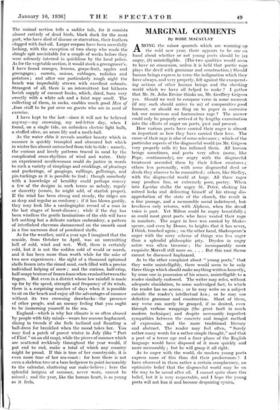MARGINAL COMMENTS
By ROSE MACAULAY
AMONG the minor quarrels which are warming up the cold new year, there appears to be one on hand about whether or not young poets should be (a) angry, (b) unintelligible. (The two qualities would seem to have no connexion, unless it is held that poetic rage plays the devil with grammar and construction.) Should human beings express in verse the indignation which they have always, and very properly, felt against the exasperat- ing actions of other human beings and the shocking world which we have all helped to make ? I gather that Mr: St. John Ervine thinks no, Mr. Geoffrey Grigson yes. Should we wait to compose verse in some moment (if any such should arrive to us) of comparative good humour, or should we fling on to paper in corrosive ink our numerous and harmonious rage ? The answer could only be properly arrived at by lengthy examination into the effects of anger on poets, past and present.
How various poets have carried their anger is almost as important as how they have carried their love. The cause of their rage is also of some relevance ; which of the particular aspects of the disgraceful world (as Mr. Grigson very properly calls it) has inflamed them. All human beings sometimes, and poets very often (some, like Pope, continuously), are angry with the disgraceful treatment accorded them by their fellow creatures ; others less personally, with some disgraceful deed or deeds they observe to be committed ; others, like Shelley, with the disgraceful world at large. All three rages may produce fine, or extremely poor, poetry. When into Lycidas stalks the angry St. Peter, shaking his mitred locks and delivering himself of his strong dis- approbation of the state of the church, the result is a fine passage, and a memorable social indictment, but loveliness only returns, with Alpheus, when the dread voice is past. Yet Milton could be angry beautifully ; so could most great poets who have vented their rage in numbers. The anger in love was carried by Shake- speare, and even by Donne, to heights that it has never, I think, touched again ; on the other hand, Shakespeare's anger with the sorry scheme of things was less anger than a splendid philosophic pity. Dryden in angry satire was often tiresome ; the incomparably more exquisite Marvell still more so. . . . But this vast theme cannot be discussed haphazard.
• As to the other complaint about " young poets," that they write unintelligibly, there would seem to be only three things which should make anything written honestly, by some one in possession of his senses, unintelligible to a reader similarly endowed. The writer may refer., without adequate elucidation, to some undivulged fact, to which the reader has no access ; or he may write on a subject outside the reader's intellectual ken ; or he may use defective grammar and construction. Short of these, any verse can surely be grasped, if so desired, even through verbose wrappings (the great fault in much .modern technique) and despite necessarily imperfect sympathies between the concrete and imagist method of expression, and the more traditional literary and abstract. The reader may feel often, " Surely rather many words for a rather simple thought," and that a poet of a terser age and a finer phase of the English language would have disposed of it more quickly and more memorably ; but he will grasp it all right.
As to anger with the world, do modern young poets express more of this than did their predecessors ? I have observed in them rather a certain complacency, an optimistic belief that the disgraceful world may be on the way to be saved after all. I cannot quite share this belief, but it is very respectable, and I hope the young poets will not lose it and become despairing cynics,










































 Previous page
Previous page